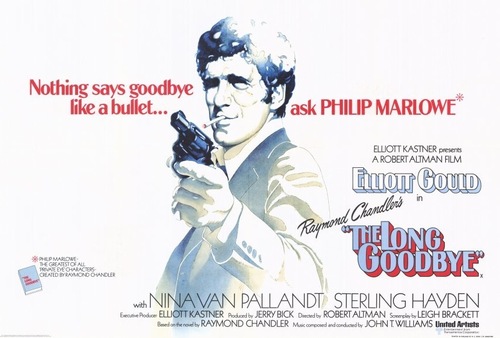
To celebrate the upcoming collected stories concert series curated by David Lang at Carnegie Hall (April 22-29), we’ll be posting pieces from past issues of the Believer that tie into with the themes of each show. The first concert in collected stories is Hero, for which we’re posting Greg Cwik’s review of Philip Marlowe in Robert Altman’s film adaptation of The Long Goodbye (from the May 2013 issue of the Believer).
A Review of Philip Marlowe in the Long Goodbye, Directed by Robert Altman
CENTRAL QUESTION: How does a filmmaker make an outdated character relevant?
Number of times Philip Marlowe has been portrayed on film: ten
Age of Elliott Gould when he played Marlowe: thirty-four
Age of Robert Mitchum when he played Marlowe three years later: fifty-eight
Best Hemingway impersonation in The Long Goodbye: Sterling Hayden, allegedly stoned the whole time
Actor Hayden replaced: Dan Blocker, who died just before principal photography began
Film’s tag line: “Nothing says goodbye like a bullet.”
Raymond Chandler’s Philip Marlowe is malleable: literary Play-Doh for the craftily minded. As our sapient narrator, he is a lens through which we see the squalor of modern Los Angeles. We know he’s morally rigid, like an animated slab of unwritten commandments, inextirpable in his personal and political proclivities. He doesn’t take money if he finds a job unethical; he doesn’t respect corrupt police or politicians, regardless of their motivations; he doesn’t sympathize with drunks or wife-beaters; he doesn’t like the rich but he doesn’t weep for the poor. He’s a well-worn scourge of complications and intricacies, his own Osiris.
Howard Hawks and William Faulkner gracefully and loyally translated Marlowe to the screen for The Big Sleep, just seven years after the novel’s initial publication. By 1946, Chandler’s books were growing in stature, and American cinema was suffused with film noir, so the character was already relevant; he didn’t need to be modified. By 1973, though, Marlowe and his hard-boiled kin were forgotten, irrelevant, so naturalist auteur Robert Altman had a few changes to make. If Hawks’s Big Sleepis the archetypal faithful Marlowe film, Altman’s adaptation ofThe Long Goodbye is the archetypal modification: characteristically syncopated and opaque, both satire and homage, poison love letter to a genre and inside joke to its enthusiasts.
Chandler’s Marlowe thinks fast, talks faster, takes a punch like a champ. He’s invidious, antagonizing authority figures into socking him; once he sees how they throw a hook, they don’t get the chance to land a second. Altman’s Marlowe wears wide lapels and talks to his cat. He ponders his own sad, solipsistic musings because no one else...
You have reached your article limit
Sign up for a digital subscription and continue reading all new issues, plus our entire archives, for just $1.50/month.
Already a subscriber? Sign in




